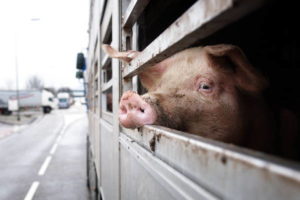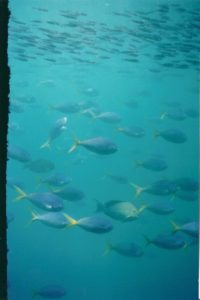Worldlog 17. travanj 2017
“Dok ima klaonica bit će i bojnih polja”. Povijesna izreka Tolstoja, ruskog pisca, filzofa i poltičkog mislioca. Danas i dalje vrlo aktualna izreka. Krajem ožujka objavljene su uznemirujuće tajne snimke organizacije Animal Rights koje su prikazale kako jedna klaonica u belgijskom Tieltu krši pomalo sve zakone koji se tiču dobrobiti životinja i sigurnosti prehrambenih proizvoda.
Šokantno, ali nimalo iznenađujuće. Znajući da u Nizozemskoj svakog sata zakolju 650 svinja i da inspektori imaju tek pet sekundi da pregledaju svinju predstavlja veliku brigu za dobrobit životinja u nizozemskim klaonicama. Zato smo mi zatražili od Donjeg doma obavezni videonadzor u klaonicama. I s uspjehom! Naš je prijedlog prihvaćem od velike večine. To je bitan korak prema transparentnosti. Tako će sektor dobrobiti životinja biti ozbiljnije prihvaćen, a potrošač će svjesnije gledati u svoj tanjur. Riječima Paula McCartneyja: “Kada bi klaonice imale staklene zidove, svi bismo bili vegetarijanci.”

Šokantne vijesti i iz našeg podvodnog svijeta. Koralju na karipskom području prijeti izumiranje kroz petnaest godina, kao i velika većina autralijskog Velikog koraljnog grebena koji polako nestaje kao posljedica zagrijavanja mora. Kako bismo spasili koralj moramo svi skupa brzo reagirati i smanjiti emisiju CO2 plinova. U Europi su srećom mnoge zemlje smanjile emisiju plinova. Kao pozitivni predvodnik, Velika Britanija smanjila je svoju emisiju stakleničkih plinova za 30 posto, tako što su uveli porez na štetne plinove. To je instrument za koji se i Stranka za životinje zalaže.
No, pad u Europi morao bi se udvostručiti kako bi se postigli ciljevi postavljeni u Parizu. Nizozemska – gdje je emisija stakleničkih plinova veća nego ikad! – ima još dug put pred sobom.

Korake koje možemo poduzeti ostvarivi su samo ako vlade iskorače iz svoje destruktivne mantre rasta, rasta i rasta. Moramo prijeći na ekonomski sistem koja se temelji na snazi zemlje i na suživotu. Sistem u kojemu smo više od pukih zaposlenika, potrošača i vlasnika kapitala. Kate Raworth s Oxford University’s Environmental Change Instituta osmislila je novi ekonomski model : The Doughnut. Pročitaj ovdje zanimljiv članak o tome.
Lijepi rezultati s lokalnih izbora u Finskoj. Ugrabili mnogo glasova. Nažalost, ne dovoljno da dobije mjesto u jednom od šest lokalnih jedinica. No, prema riječima naše finske sestrinske stranke: “S malim timom i malim budžetom smo vrlo zadovoljni rezultatom.”
Srdačno,
Marianne
‘As long as there are slaughterhouses there will always be battlefields.’ A historic quote by Tolstoj, the Russian writer, philosopher and political thinker. At the same time, it is still a topical quote. At the end of March, some highly confronting undercover images taken by the animal welfare organisation Animal Rights were published, which showed that almost all rules and regulations for animal welfare and food safety were structurally violated in a slaughterhouse in Tielt in Belgium.
Shocking, but not surprising. Knowing that 650 pigs are slaughtered every hour in the Netherlands and that inspectors get not even five seconds to check a pig causes also great concern about the treatment of animals in Dutch slaughterhouses. That is why we made a plea in the Lower House for mandatory CCTV in slaughterhouses. And we did so successfully. Our motion was adopted by a great majority. An important step towards more transparency, thus forcing the industry to take animal welfare more seriously and the consumer to be more conscious of the meat on his or her plate. And to quote Sir Paul McCartney: ‘If slaughterhouses had glass walls, everyone would be a vegetarian’.

There were shocking messages concerning our underwater world. The corals in the Caribbean are threatened to vanish within fifteen years and large parts of the Australian Great Barrier Reef are affected by severe bleaching due to the warming of seawater. To save the corals, we should all immediately reduce the emission of greenhouse gases into the atmosphere. Fortunately, many countries in Europe reduced their emissions considerably already. With Great Britain as a positive peak, which reached a reduction of 30 per cent, partly due to the introduction of its CO2 prices. An efficient instrument which is advocated by the Party for the Animals too.
Yet, greenhouses gases in Europe must be reduced twice as fast to meet the Paris climate goals. And the Netherlands – where the emission of greenhouse gases increased to the highest level ever! – still has to make great efforts.

Efforts that can only be achieved if the governments set aside their destructive mantra of growth, growth, growth. And change to an economic system that is based on the capacity of the earth and society. A system where we are more than just employees, consumers and owners of capital. Kate Raworth of Oxford University’s Environmental Change Institute thought up such new economic model: The Doughnut. Read here the interesting article about it.
Great results at the municipal elections in Finland. Many votes obtained. But unfortunately just not enough to obtain a municipal council seat in one of the six participating municipalities. But as our Finnish sister party pointed out ‘A great result with a small team and a small budget.’
Until soon. Kind regards,
Marianne